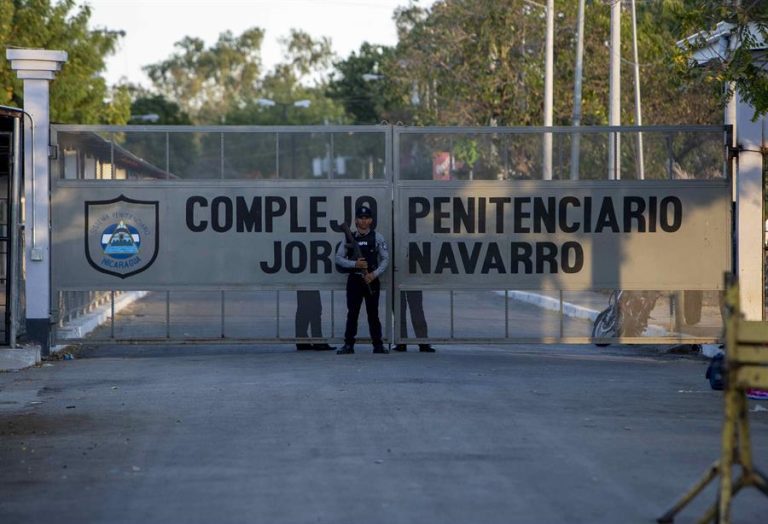10 de mayo 2023

European Concern over Lack of Academic Freedom in Nicaragua

PUBLICIDAD 1M
PUBLICIDAD 4D
PUBLICIDAD 5D
Four indigenous Mayangnas at La Modelo prison are "in their underwear or naked, subjected to physical and sexual punishment and chained hand and foot"

Four indigenous Mayangnas, imprisoned since August 23, 2021, are being subjected to a "regime of torture", which includes inhumane conditions of confinement, threats of injury and death and sexual abuse, according to complaints made by four Nicaraguan and foreign groups to the Inter-American Commission on Human Rights (IACHR).
In August 2021, a massacre occurred in the community of Kiwakumbaih, jurisdiction of the Mayangna Sauni As territory, in the North Caribbean of Nicaragua. Survivors of the attack pointed to a group of approximately thirty armed men, who spoke Spanish, wore military clothing and used high caliber firearms. However, police authorities instead blamed a group of 13 people from the Mayangna community.
Four of the 13 indigenous people were arrested: the territorial trustee, Ignacio Celso Lino, the communal judge of Suniwás, Argüello Celso Lino, and the forest rangers Dionisio Robins Zacarías and Donald Andrés Bruno. The four were accused of raping, torturing and sexually abusing eleven people during the massacre and, on March 10, 2022, were sentenced to life imprisonment for allegedly being co-perpetrators of the crime of aggravated murder to the detriment of nine people.
The World Organization Against Torture, the group Acción Penal, the University Center for Dignity and Justice of the Jesuit University of Guadalajara and the Center for Legal Assistance to Indigenous Peoples (Calpi) denounced through a letter addressed to the IACHR that the process against the four indigenous people was "full of irregularities".
Among the arbitrariness they pointed out that they were "detained without a court order, abstracted from their natural judge, left incommunicado for several months, denied the protection of habeas corpus, violating their right to due process and the presumption of innocence".
Through relatives of the detainees, Calpi verified the conditions of the prisoners. The last time they were seen they were in a punishment and isolation cell, with their feet shackled, very thin, three of them pale and one of them swollen.
The detainees suffer from "chronic illnesses" and do not receive "medical attention or medication". In addition, they sleep "on cement slabs, without mattresses or sheets", and remain "in their underwear or naked, subjected to physical and sexual punishment and chained hand and foot".
"Regarding sexual abuse, they point out two modalities; first, perpetrated by the other inmates - common prisoners - sexually penetrating them while threatening them with bladed weapons in the prison. On the part of the guards, who carry out the humiliations with objects such as the points of the weapons, batons, etc.".
During the first year in prison, the families of the indigenous people could bring them prepared food, but conditions have worsened since December 2022. Now that they are in punishment cells, they cannot properly relieve themselves or prepare their own food. Instead, they are limited to consuming the prison's food, which they describe as "raw and in poor condition".
The detainees were also subjected to constant interrogation during their first year in prison, until they were separated and sent to cells with common prisoners, who -- upon hearing that they did not speak in Spanish, but in their native language -- beat them and threatened to kill them with razor blades or weapons.
Calpi, the World Organization Against Torture, Acción Penal and the University Center for Dignity and Justice of the Jesuit University of Guadalajara consider that the four Mayangna community members "pay unjust, arbitrary and disproportionate sentences" and consider that this regime of torture "will cause them irreparable damage".
This article was originally published in Spanish in Confidencial and translated by our staff.
PUBLICIDAD 3M
Confidencial es un diario digital nicaragüense, de formato multimedia, fundado por Carlos F. Chamorro en junio de 1996. Inició como un semanario impreso y hoy es un medio de referencia regional con información, análisis, entrevistas, perfiles, reportajes e investigaciones sobre Nicaragua, informando desde el exilio por la persecución política de la dictadura de Daniel Ortega y Rosario Murillo.
PUBLICIDAD 3D